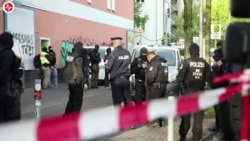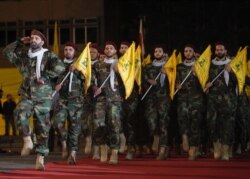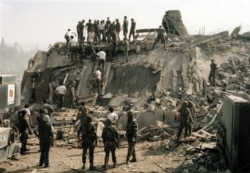On April 30, Germany implemented a full ban on the Lebanese Shiite organization Hezbollah, designating it as a terrorist organization. Simultaneously, German police arrested 1,050 people suspected of ties to the group in a series of raids.
German authorities previously had classified the group’s military wing, which operates mostly in Lebanon and Syria, as a terrorist group, excluding Hezbollah’s political branch. The new ban makes it illegal to publicly praise the group or display its flag.
In a televised speech May 4, Hezbollah Secretary General Hassan Nasrallah said Germany had “succumbed to American will.” He blamed the United States and Israel for influencing the German government. He also denied Hezbollah was active in Germany.
“When we say we are not active in Germany, we are being 100% honest.”
That is false.
Germany’s neutral stance on the group’s political wing, which mirrored European Union policy, allowed Hezbollah to use the country as a safe location for fundraising and money laundering, which was used to finance the group’s military wing.
In November 2018, 15 Hezbollah-linked individuals went on trial in Paris after an extensive investigation by European and U.S. authorities uncovered a money laundering network with ties to South American drug cartels. Although the trial took place in France, four of the suspects were arrested in Germany and millions of euros are believed to have been laundered there.
Hezbollah is thought to have first established a presence in Germany in the 1980’s – or nearly from its inception. In 2012, German intelligence estimated that as many as 950 Hezbollah operatives resided in Germany. In 2014, German authorities banned the non-profit group Orphans Project Lebanon after determining it was linked to the Lebanese Shahid (martyr) Foundation, which they called an “integral” part of the Hezbollah organization.
Germany and France began considering such a Hezbollah ban in 2013 due to the militant group’s role in the Syrian civil war. Soon after the start of that conflict, Hezbollah and other Iran-backed forces began helping Syrian President Bashar al-Assad’s regime.
German authorities have also accused Hezbollah of spreading anti-Semitic propaganda under the guise of criticism of Israel.
The EU designated Hezbollah’s military wing a terrorist group after its operatives carried out a bombing in Burgas, Bulgaria, in 2012. However, some experts have dismissed the idea that there is a clear distinction between the political and military components of the organization.
Hezbollah has its roots in the Lebanese Civil War, during which Israeli Defense Forces invaded southern Lebanon, occupying it from 1983 to 2000. Backed with financing, training, and arms from Iran, Hezbollah became one of the world’s most combat- effective militant groups, fighting the IDF to a standstill during the 2006 Lebanon War. It is suspected of involvement in organizing two suicide truck bombings targeting foreign peacekeepers in Beirut in 1983 that killed 241 U.S. Marines, 58 French military personnel and six civilians.
The group has also been implicated in acts of terrorism abroad, including the 1994 bombing of a Jewish community center in Buenos Aries, Argentina, which killed 85 people. A United Nations Special Tribunal investigating the assassination of Lebanese Prime Minister Rafic Hariri in 2005 implicated Hezbollah.








